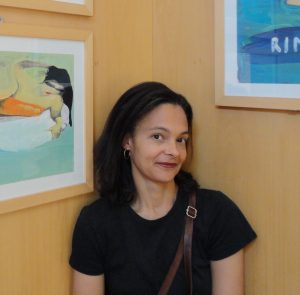Suzette Mayr
This story is an excerpt from “Five Floors of Basement” (working title), a quasi-haunted-house novel that centres on a university professor named Edith who works at the fictional University of Inivea. Her office is in Crawley Hall, a building that produces “sick-building syndrome” in its residents. The novel follows Edith’s mental and physical disintegration as she tries to determine if she is being overwhelmed by too much university bureaucracy and asbestos renovation, or if she is being affected by Crawley Hall’s inherent evil.
[mks_dropcap style=”letter” size=”52″ bg_color=”#ffffff” txt_color=”#000000″]I[/mks_dropcap]n order to complete her Academic Achievement Overview (not due until the second week of December, but Edith dreads that scrubbed raw steel wool feeling in her stomach and chest when she’s filling out her AAO at the last minute), she’ll need to log in to her MYUOFI, click on the AAO button, and upload her supporting documents using the OBGM. But even though she’s entered the SAS, logged into MYUOFI, and clicked the AAO link, when she clicks the OBGM button it just broods like a meatloaf no matter how many times or how forcefully she clicks, even when she tries the alternate option of the YOD button. Which sits smug and pointless as a used teabag. Which means she’ll have to phone the FRIC office, and she can predict exactly what those pencil-heads in FRIC will say: contact IT.
The washing machine dings in its tiny closet.
She hates doing her AAO so much she could brain it with a hammer.
She punches the OBGM button with one more mouse click, like her index finger is a fist, and the button a tree.
The washing machine dings again, clunks, sounds out three half-spurts, then clunks one more time. She pushes herself away from her desk, slings open the washing-machine door. Her clothes gather in a soggy pile, scattered with chunks of undissolved laundry soap.
She needs a new washing machine. She has no time to buy a new washing machine. She slams closed the washing machine. Resumes clicking the OBGM button. Clicks it exactly ten more times. Lifeless.
Screw it.
She scoops up her car keys. She screeches off in her cracked-up red Ford Taurus to Bull Head Shopping Centre to buy a new machine.
◊ ◊ ◊
Fifteen minutes later, Edith bypasses the endless escalator chain that leads to the household appliances floor, seduced instead by the starburst of perfumes and jewellery on the main floor. The perfume sample on her left wrist smells like vanilla pudding, her right wrist wooden petunias. She jams her purse into her armpit, bullets for the escalator.
At the very last micro-second, she swerves.
◊ ◊ ◊
Eighty-nine minutes later, Edith’s feet whine in their strapped loafers. Her shoulders slump. She stands, sixth in line, at the glass and white quartz counter in P. T. Madden, the new women’s clothing store to the left of the caramel popcorn stand at the south end of the shopping mall. To the right of the faux-Victorian lotion shop that sells hand lotion for $125 a gram. A part of the mall she never visits, but her mother’s birthday looms. Edith wants to buy hand lotion made from avocado, goat’s milk, and Bali sea foam to spoil her mother, her mother’s hands rough as Brillo pads from so many years as a hairdresser, and her mother agrees once a year at her birthday to indulge in a bucket of caramel corn even though she has to take her three false teeth out to do so. Edith noticed a professor from the School of Drama and Philosophy in Edith’s university was browsing in P. T. Madden so Edith zoomed in, sorted through hangers and geometrically folded stacks of clothing, then settled on three new blouses and the stiff cardigan slung neatly over her forearm while she waits in line. She knows the patterns are wrong, her mother’s always reminding her she doesn’t have the body type for patterns.
– Your boobs turn patterns into porridge, Deedee, her mother reminds her. Frequently.
Her ex-girlfriend Beryl once told her she dressed like a Poindexter. Edith loved Beryl so much.
When she was a teenager and she’d show off her new clothes to her father, he would tsk and down another cognac.
– I’m not sure why …, he’d say, you gravitate to clothes that make you look like … a dining-room table.
His daughter a porridgey, furniture-shaped disappointment. A melancholy Poindexter dumped in the prime of life.
She shouldn’t be spilling money on clothes. She should be planted in front of her desk at home. Or in her office. Filling out her AAO. Or at the very least writing a draft of a paper she has to give at the PULE conference, also in December.
But Vivianne said she could shop. Said Edith should as a reward to herself. One blouse has tiny navy-blue flowers clustered all over, like in a rock garden in a murder mystery where someone is about to get smacked from behind with a rusty, dirt-crusted shovel. But you can’t tell they’re flowers, you can’t notice the petals, unless you’re up extremely close. She loves the flowers’ tediousness, the repetitiveness of their petals, stamens, leaves. She strokes the collar. The dry, textile fragrance. She deserves these clothes. For she is finally the author of a bona fide book.
Her heart flutters, like the pages of a discarded paperback. It took her thirteen years to write Taber Corn Follies: The Western Canadian Life Story of Beulah Crump-Withers, soon to be published by University of Okotoks Press, a William Kurelek prairie painting reproduction on the cover. Six years as a PhD student, seven as a professor, and just in time for this year’s AAO. The giant diamond that will sit in the platinum, Times New Roman setting of her AAO. The pages being folded and glued likely at this very second on a massive printing press. She can’t wait for the buzz of the intercom, the mail carrier in his or her smart uniform in her condominium lobby asking her to sign for the cardboard package, her slicing open the package with her Exacto knife to copies of her very own book with her very own name on it, the pages smelling of coastal forest and binding glue, the covers shiny and perfect, then moistened with her tears of elation and success.
She hugs the new clothes to her chest.
The cardigan will drape long, like a cape with sleeves. An author’s cardigan.
Edith wonders whether she might have had better luck with retrieving her AAO if maybe she’d clicked the OBGM before opening the SAS portal. She has four months to complete her AAO, but still.
If her mother were here, she would ambush Edith with armfuls of girly, blocky colours, perhaps trilled with lace or frills, and say, Edith Lynn, look at this! You should try it on! Pink makes a woman look youthful, fresh.
Edith would say no, she doesn’t like girly clothes, and her mother would say, What’s wrong with pink? Why are you so stubborn? You were a stubborn baby, and now you’re a stubborn adult who dresses like she’s 65 going on 102.
The professor from Drama and Philosophy left the store almost forty-eight minutes ago, and Edith has no idea what she bought, but Edith estimates that all the other female professors who have published books wear long cardigans like this, or unstructured blazers that drop past the hips, or skirts that fall below the knee. Patterned blouses. She has never managed to dress au courant. Her outfits always morph into ill-fitting costumes once she rolls her car up to the university campus, sits through meetings, pontificates in classrooms. But this year will be different. This year she will look like everyone else. With a book, she will be like everyone else. This year will be perfect.
She tugs a credit card from her wallet, deposits the ironed folds on the counter, their buttons ticking on the glass. Her watch bangs the glass too. 3:03 p.m. This afternoon is drifting away from her.
A pair of fake pearl earrings, each pearl the size of a knuckle, perches on a velvet bubble nest under the glass of the counter.
– I’ll need those too, she says. She taps her credit card on the glass. And this scarf.
She twitches a scarf from a stand on the counter, it waterfalls into her hands.
She could perhaps wear the scarf, an airy tulle thing with harlequin diamonds, around her neck. The pattern moves her, the cloudiness. But she never wears scarves. It will likely just go in a drawer. Or she’ll tie it around the handle of her suitcase.
Back to school. She needs the proper clothes this coming September to start the academic new year right. Her new psychologist told her to try it.
– They don’t call it retail therapy for nothing, said Vivianne. Back-to-school shopping isn’t just beneficial for children, she said, her voice rich and nutritious as a banana on the other end of the line.
Edith has never met Vivianne in person, but she imagines her as an older black woman, with elaborate grey braids, round and wise as a fir tree. Silver drop earrings. Or old Roman coins. A stuffed owl on a perch in the background. A woman like Edith’s dead grandmother in her mother’s peeling album full of painfully staged family photos.
Edith will finish her third course outline tonight. Start the edits on her paper for the PULE conference tonight.
Next Edith will buy shoes from Hangaku even though they don’t look that comfortable, verging on too architectural for human feet. All the fashionable female professors wear Hangakus. The distinctive hourglass-shaped heels. Edith learned about them last year when she finally broke down and asked a history professor in line at the IT Help Desk what they were.
– Clothing is how you want the world to see you, said Vivianne. See me, your clothes say. Look at who I am.
Edith will tighten up her marshmallow body too; she’s signed up for a Wednesday night Ballet for Beginners class at a ballet studio near her house, and she will do some kind of exercise at least once a week. Vivianne suggested she try a scheduled, regular fitness class to encourage her to balance her work and life. When Edith told Vivianne she enrolled in a hatha yoga class some years ago, bought a mat and everything but hated it, hated exercise in general, Vivianne told her to try a class that didn’t seem like exercise. Like a ballet class. Or scuba diving.
Edith said, I like watching ballet. I like to swim.
Vivianne said, Excellent! So swim your heart out. The negative ions in the water will stimulate your happiness centre. The University of Inivea has an Olympic-calibre swimming pool, so you could slip in a swim before or after your day.
– But there’s never any time.
Vivianne cleared her throat, turned pages. No doubt in a notebook she uses to write down her patient assessments. No doubt Vivianne’s fingers starred with silver rings and turquoise rectangles. A hippie earth goddess with multiple PhDs who begins each morning with one hundred fervent sun salutations.
– There’s time for anything if you make time, said Vivianne. Time is an illusion. Think about the metaphors. Time spent, lost, wasted, behind the times, passing, keeping time. Time being made. What’s something you like to make, Edith?
– I like to … when I was a teenager I used to like making … matrimonial squares.
– Make your time the way you would make matrimonial squares. Time is your tool. Delicious.
– Time is my tool, Edith repeated. Delicious.
– Time doesn’t own you. You own time.
– I own time.
– Yes!
– Yes.
– Make the time. Eat the time.
– Make the time. Eat the time … like matrimonial squares.
– You own yourself.
– I own myself.
Once upon a time Edith’s PhD supervisor said, I own you. But that was a long time ago. And of course the supervisor lied. Edith blots out the thought.
In a past session Vivianne told Edith to forget about her supervisor, Mary Ellen.
– That’s a history best left interred, Vivianne’s voice clucked from the phone. Move on with your life. Let Mary Ellen move on with hers. You are not her puppet. She is not your puppet master. Laser away that dead skin. There. I’ve lasered it.
In her brand new Hangakus with their hourglass heels, Edith stilt-walks past the Victorian lotion and the caramel corn shops without stopping, wobbles past the escalator leading up to the rows and boring rows of white and stainless steel refrigerators, dishwashers, washing machines and dryers, her hand swinging a cloth bag with its P. T. Madden logo, another bag with the Hangaku brand swirl holding her old loafers, her wrists smelling like imaginary gardens. She bought a bottle of the perfume that smells like vanilla pudding too, so her neck smells new.
The shoes are still stiff, she admits, the odd heels like walking with spurs. But all shoes need some breaking in, right?
She piles her bags into the Taurus.
Riding a wave of self-congratulation, she tops up the gas tank at the Novacrest station at the east end of the mall parking lot, the clicks of the litre indicator matching the clicks of happy retail therapy self-righteousness. Her credit card bloats just a little bit.
She revs around the concrete silos of the shopping centre parking lot to the ramp leading onto the highway, her bags thumping to the car floor, but she can’t brake, her car bullying its way into belligerent traffic. She clicks to turn left towards the thicket of condominiums where she lives. When she was hunting for a place, right after she started making enough money to afford living without a roommate’s crusted beer spills in the fridge and leg hairs in the tub, she only considered new buildings. No sixty-year-old dodgy bungalows with drafty windows and low ceilings, no slapped-together 1990s infills with stucco peeling from the outer walls, no jinxed 1912 haunted houses with mouldy roofs and leaky, gnarled foundations. She wanted clean. Sawdust-smelling new. Shiny chrome, glass, and stainless steel, quartz; she wanted to be able to saunter to a bookstore, a coffee shop, a grocery store, a liquor store. Take the train to the university if she had to. Even though Inivea is not that kind of city, and neighbourhoods in Inivea with all those nearby amenities are scarce. Even though the University of Inivea train station is where a student was stabbed in the heart by a young white man who thought he was the fallen angel Abezethibou hunting for his lost wing. Even though she spends more time at the university than she ever does in her condo. Her condo within walking distance of a second-hand bookstore, a singles’ Safeway, a 7-Eleven, Ollie’s Magic Liquor Barn, magic because hardly any of the wines cost over $20 and her favourite rum sells for only $23 a bottle. The ballet studio in the old Canadian Pacific Railway station where she’s signed up for a fitness class. A coffee shop, the Kaffee Klatsch, on the main floor of her condo. She even has her own regular table in the Kaffee Klatsch. Perfect.
◊ ◊ ◊
On her quilted bedspread at home, the P. T. Madden bag crinkles as she slides out the clothes in their tissue paper envelopes. She unfolds the first envelope. She holds the navy-blue flowers up to the fading afternoon light through the window.
Sweet william. Or … lobelias.
She peels off the P. T. Madden sticker on the second envelope. Black sweet williams or lobelias.
The third envelope. Olive-green lobelias or sweet williams.
She slides her hands into the armholes of the navy-blue blouse. Buttons it closed one by one from her throat to her lower belly. The mirrored closet door reflects the petals back at her. She smoothes her hands down the sides. Strange little florets. No one will pierce past this armour.
Not Mary Ellen, her old supervisor.
Not even Coral.
Whom Vivianne told her to stay away from.
– Sometimes, Vivianne told her, her earrings tinkling, sometimes too much passion is not good for a person. Occasionally, said Vivianne, in certain circumstances, a person’s unchecked imagination, her misdirected intelligence as it were, can lead her on a journey into an unhealthy place.
– But then maybe I should try to help her?
– Or you could just stay away from her, said Vivianne, sounding like she was smacking her lips. Not let her speculations and imaginings splash onto you and distract you, jeopardize your reputation as a scholar heading into mid-career under a newer, more rigorous headship. This next round of your Academic Achievement Overview. You’re not … ah … the most prolific academic, Edith.
Edith’s right eyelid twitched so hard she clapped her hand to her eye. The eyelid bucked twice again under her fingers. Vivianne paused.
– You have a book coming out soon, and kudos for that. But you can’t afford distractions. So that means you have to excel at many things, which you certainly do, I assure you. You just have to excel at a few other things too.
Edith could hear Vivianne’s likely Burgundy Wine lipstick smile on the other end of the phone.
– But if you watch your p’s and q’s, maintain your work-life balance, stay out of the company of troublemakers like Coral, well, that definitely helps in the long run. Avoid negativity. Correction: flee negativity. I’ve witnessed the positive effects with other clients from the university. A woman in the Math department. A male professor in Economics.
– You really think so?
– I know so. Say this with me: I am the architect of my life; I build its foundation and select its furniture.
Edith closed her eyes.
– I am the architect of my own life, she said. I build its foundations and select its fixtures.
– Furniture, said Vivianne.
– Furniture, repeated Edith.
– You, said Vivianne, you, Edith, are the architect of your life. You don’t have to invite anyone into your house if you don’t want her there.
– You’re right. Thanks, Vivianne.
– You’re welcome, Edith. We’re at the end of our time now. Goodbye.
The phone clicked before Edith had the chance to say goodbye. Her appointments with Vivianne always ended like this. The only disappointing thing about Vivianne.
She sits alone in her shiny condo. New clothes, new shoes, new smell, new tank of gas, but barricaded on every side by paper stacks, books she doesn’t want to read but should. Must.
She clicks open the OBGM, then the SAS. Maybe this time the AAO will work.
Oops! This page does not exist L, the computer barfs.
Her email pings. An email from Coral. Coral, her friend.
Coral was her friend.
She needs to find a new friend.
Edith unbuttons the top button of her new blouse.
 Suzette Mayr is the author of four novels, including her most recent, Monoceros, winner of the ReLit and W. O. Mitchell Awards. Monoceros was also longlisted for the Scotiabank Giller Prize and nominated for the Ferro-Grumley Award for LGBTQ Fiction. She lives and works in Calgary.
Suzette Mayr is the author of four novels, including her most recent, Monoceros, winner of the ReLit and W. O. Mitchell Awards. Monoceros was also longlisted for the Scotiabank Giller Prize and nominated for the Ferro-Grumley Award for LGBTQ Fiction. She lives and works in Calgary.






